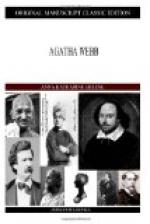And this seemed a final judgment, even in this hour of public justification. He had told his story and been for the moment believed, but what was there in his life, what was there in the facts as witnessed by others, what was there in his mother’s letters and the revelation of their secret relationship, to corroborate his assertions, or to prove that her hand and not his had held the weapon when the life-blood gushed from her devoted breast? Nothing, nothing; only his word to stand against all human probabilities and natural inference; only his word and the generous nature of the great-hearted woman who had thus perished! Though a dozen of his fellow-citizens had by their verdict professed their belief in his word and given him the benefit of a doubt involving his life as well as his honour, he, as well as they, knew that neither the police nor the general public were given to sentimentality, and that the question of his guilt still lay open and must remain so till his dying day. For from the nature of things no proof of the truth was probable. Batsy being dead, only God and his own heart could know that the facts of that awful half-hour were as he had told them.
Had God in His justice removed in this striking way his only witness, as a punishment for his sins and his mad indulgence in acts so little short of crime as to partake of its guilt and merit its obloquy?
He was asking himself this question as he bent to fasten the gate. His father had passed in, the carriage had driven off, and the road was almost solitary—but not quite. As he leaned his arm over the gate and turned to take a final glance down the hillside, he saw, with what feelings no one will ever know, the light figure of Agnes advancing on the arm of her father.
He would have drawn back, but a better impulse intervened and he stood his ground. Mr. Halliday, who walked very close to Agnes, cast her an admonitory glance which Frederick was not slow in interpreting, then stopped reluctantly, perhaps because he saw her falter, perhaps because he knew that an interview between these two was unavoidable and had best be quickly over.
Frederick found his voice first.
“Agnes,” said he, “I am glad of this opportunity for expressing my gratitude. You have acted like a friend and have earned my eternal consideration, even if we never speak again.”
There was a momentary silence. Her head, which had drooped under his greeting, rose again. Her eyes, humid with feeling, sought his face.
“Why do you speak like that?” said she. “Why shouldn’t we meet? Does not everyone recognise your innocence, and will not the whole world soon see, as I have, that you have left the old life behind and have only to be your new self to win everyone’s regard?”




